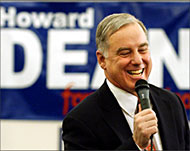Democrat rivals face key test
The Democratic presidential contenders are facing the biggest test of the season so far, with front-running John Kerry pledging “a real conversation with America”.

Seven states hold primaries or caucuses on Tuesday, representing more than 12% of the 2162 delegates needed to claim the Democratic nomination and take on President George Bush.
Kerry holds comfortable leads in polls in five of the states-Arizona, Delaware, Missouri, New Mexico and North Dakota.
But he is trailing behind North Carolina Senator John Edwards in South Carolina and is locked in a tough fight with former NATO commander Wesley Clark in Oklahoma where polls were divided over who was ahead.
Kerry, the winner in Iowa and New Hampshire, hoped to sweep Tuesday’s votes, chase his rivals from the race and focus on Bush, who is dropping in opinion polls and struggling with criticism over the Iraq war and his ballooning budget deficit.
But Edwards, Clark and former frontrunner Howard Dean were all trying to win enough delegates to keep the race open at least until so-called Super Tuesday on 2 March, when 10 states holding 1151 delegates are up for grabs.
Crucial support
Meanwhile, Kerry was continuing to pick up big-name endorsements, winning the backing of the United Farm Workers union and Washington Governor Gary Locke.
Aides have said the union’s backing will give Kerry crucial support among Hispanics who are a key constituency in New Mexico and Arizona.
 |
|
Howard Dean has lost momentum |
Washington state holds caucuses on Saturday.
For days, Kerry has largely ignored his Democratic rivals and focused on Bush.
In his latest assault, he accused the current administration of an “incredible cave-in” to drug companies at taxpayers’ expense, citing the dramatically higher cost estimate for the new Medicare overhaul.
The administration now puts the 10-year cost of the prescription drug benefit at $534 billion. That is one-third higher than the $395 billion figure from the Congressional Budget Office that administration officials and Republican congressional leaders cited as they pushed the legislation through Congress in November.
Kerry used the revised Medicare figures to illustrate his campaign theme that the pharmaceutical industry is the main beneficiary of the new drug benefit.